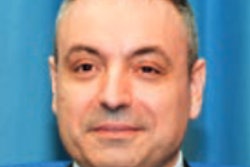
Fancy improving your CV by presenting a poster at a major congress like ECR? Then read on and let Dr. Maria Argyropoulou, EPOS (Electronic Presentation Online System) editor and a member of the Postgraduate Educational Programme for ECR 2014, explain how different posters can be created and how to go about finding a topic. She also provides insight into planning and presenting award-winning posters. Yes, it may only be a poster, but you should also see it as the first step on your path to greater things.
Note: The following interview was originally published in ECR Today on 10 March 2014.
ECR Today: What do you think is the best way to plan a poster project?
 Dr. Maria Argyropoulou is head of the department of radiology at the University of Ioannina School of Medicine in Greece.
Dr. Maria Argyropoulou is head of the department of radiology at the University of Ioannina School of Medicine in Greece.
Dr. Maria Argyropoulou: Poster preparation is a complex task that requires careful planning. Organize your time. Find out the deadline and make a schedule allowing for unexpected delays. Allow time for IT issues and reviews from your supervisors. Plan to submit at least one week before the deadline. Choose your topic and a carefully crafted main message of the poster. Gather your data, decide what is most important, then organize this material in the poster clearly and succinctly. Strictly follow author guidelines.
All visuals and text should relate to those points and conclusions. Even if your data are perfect and presentation is good, it will be your choice of colors, images, graphs, charts, and illustrations that distinguish you from the crowd. Get help if you find handling visual items challenging, and ask your superiors for advice.
ECRT: What advice can you give to a young radiologist or trainee hoping to present a poster at the ECR?
Argyropoulou: I would suggest overcoming any possible uncertainty or fear of making mistakes; be bold and give it a try. Of course it does take good preparation and a lot of work to produce an acceptable poster, but just consider all of these as further steps in your training path.
ECRT: What kind of poster should people opt for, and what are the advantages and disadvantages of choosing this kind of poster?
Argyropoulou: There are two different types of ECR poster, depending on their content: scientific posters, which present an original research study; and educational posters, which review a known topic.
Do not think of educational posters as being easier just because they describe established knowledge and think that a literature review is enough. Often, they require a wide perspective of the presented topic and an ability to discern its important features. Scientific posters are more focused in their context, but they produce new knowledge and, therefore, require sound methodological and interpretation skills. The choice between these two types depends on the background and the environment of each trainee. In both cases, help and consultation from senior colleagues are imperative.
ECRT: How can trainees find good topics, especially those working in small hospitals?
Argyropoulou: Despite the scientific progress, the human body remains a mystery and provides hundreds of unanswered questions and plenty of research space for everyone who wants to explore it. Small hospitals are usually short of state-of-the-art equipment or rare cases. Conversely, small hospitals have a serious advantage over large reference medical centers, which may be overspecialized, limiting the interdisciplinary integration of knowledge. In small hospitals, radiologists have a wide range of practice and communicate with many different medical disciplines. Sometimes the dots are just in front of our eyes, but nobody has ever stepped back to see the bigger picture and connect them.
ECRT: Can you tell us about the best posters you've seen and what made them so great?
Argyropoulou: All the Magna Cum Laude ECR posters share the same qualities: clarity, accuracy, simplicity, logical coherence, smooth flow of information, and beautiful illustrations.
ECRT: What kind of posters would you reject and why?
Argyropoulou: Posters lacking accuracy, methods, or facts cannot be accepted. The purpose must suit the methods; conclusions need to comply with results. The poster needs to be understandable in terms of language, complexity, and scientific contents. Good images are an essential element of a poster; therefore, there have to be images in each poster, and their quality is taken into consideration. Case reports are not accepted, and small datasets also will worsen the evaluation result.
ECRT: Do you have any other poster presentation tips to share with us?
Argyropoulou: Avoid too much text. Images are more attractive than text. Use "reader gravity," which pulls the eye from top to bottom and left to right. Keep it simple! Remember that viewers will take away one or two points from your poster and simple messages are more memorable.
Dr. Christiane Nyhsen is a consultant radiologist at Sunderland Royal Hospital in the U.K., a former chairperson of the European Society of Radiology (ESR) Radiology Trainees Forum, and a member of the AuntMinnieEurope.com Editorial Advisory Board.



















